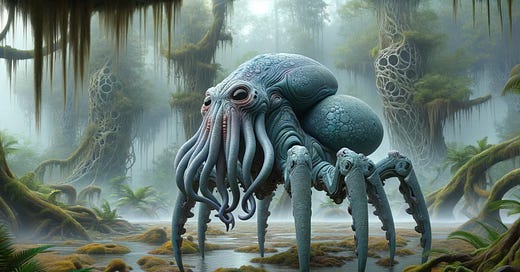📗Compendium | 5: Octopider
by Acclaimed Interstellar Survival-Exploration Entrepreneur and Nature Documentarian Sir Davis Astenbarrow
This is Hanlon’s Reader, an independent author’s publication. Here you’ll find stories, books, essays, and other things. I’ll be tinkering away here for a while.
If you’re using a web browser to read, you can use these links to help find your way:
📗Short Stories | 📘Books | 📙Personal Essays | 💌Newsletter | ❓About | 🏡Home
App Users: the categorized Tag links above don’t work in-app, so you may find it easier to use the Content Calendar or direct links to story posts to navigate my publication.
📗A Compendium of Beasts, Bugs, and Botany
1 | 2 | 3 | 4 | 5 | 6 | 7 | 8 | 9 | 10
📗A Compendium of Beasts, Bugs, and Botany
The Explorer’s Guide to Surface Life
Octopider
Explorer’s Guide Contribution Written By Acclaimed Interstellar Survival-Exploration Entrepreneur and Nature Documentarian Sir Davis Astenbarrow

AN URGENT NOTE FROM THE AUTHOR:
Hello, dear readers. This is Davis Astenbarrow, author of A Compendium of Beasts, Bugs, and Botany, again addressing Mother Earth’s fellow explorers, naturalists—and quite openly, enthusiasts of any kind from all walks of life. It is with deep regret that I must preface this entry with a dire and earnest warning:
You. Are. Out. Of. Time. Depart!
With kindness, understanding, and in the spirit of serendipity,
Sir Davis Astenbarrow
The remarkable similarity between the fauna on Earth and those discovered so far on Surface continues to be an area of great interest to evolutionary biologists. Is there perhaps a degree of predeterminism in life’s various forms based on an organism’s environment and conditions? Such questions draw bright, inquisitive minds to Surface from many of humankind’s outposts among the stars—but most chiefly, our new arrivals come from our own evolutionary origin point, Earth.
It is a creature such as the Octopider which truly illustrates the sameness binding our distant worlds together. Having covered the different castes of insectoid Lotus Wasps already, readers are prepared to understand the bugs’ primary predator. Below you will find the dominant species within the jungle swamps nearby Overlook City called the Bloatback Octopider:
This fearsome carnivore’s name derives from the inflatable, gas-filled, leathery flesh sac attached to its head, which rests on top of its main abdomen. While the precise methods are poorly understood and require further study, it is widely believed that due to the increased gravity on Surface, the denser atmosphere allows trapped gases such as hydrogen and helium to provide a bouyancy effect.
When inflated to retain these gases, the Bloatback Octopider becomes lighter and faster while pursuing prey (or escaping from other predators) and can expel the gases at will to increase its weight. This makes it an excellent ambush predator: its favorite tactic is to climb to high tree limbs or cliff edges with its gas sac inflated, then drop onto its prey while suddenly deflating the sac to gain speed. However, it takes time for its internal biological processes to replenish these reserves.
Other species like the Pygmy Waterweb Octopider instead prefer a more passive approach. While unable to spin its own silk like many of Earth’s spiders, the Pygmy Waterweb uses its dexterous mouth-tentacles to weave vines and hanging moss into flexible underwater basket-like webs. These traps lurk in the current to catch their quarry and hold them in place for the Octopider to return back to. These smaller, weaker beasts often find themselves in competition with their Bloatback cousins—or at times during lean seasons, prey.
Whatever the occasion, you’ll never regret bringing a crate of Asten-Scout™ Orb Drones along! Before venturing out into the deep, verdant wilds make sure to stop by Asten-Mart™ to resync and resupply. With a simple click and toss, these delightfully intuitive devices will deliver high-value reconnaissance directly to your Nullsuit™ feed. Our wonderful Associates can cheerfully assist you with training or recalibration at no additional charge!
Captured from the internal monologue of Harvester Wes Jackson:
A pair of prowling octopiders emerged from the water, still dripping. They moved low to the ground, their strong, segmented legs pushing off in cautious, start-stop bursts.
In front of the creatures, drooping from below their round, black eyes, thick tentacles wriggled with minds of their own, noticeably out of sync with the rest of their movements. They would probe and wrap around things, curling in under the main body where the mouth must have been. Always touching, tasting, smelling. And watching with those unblinking eyes.
📗Short Stories | 📘Books | 📙Personal Essays | 💌Newsletter | ❓About | 🏡Home














Do they taste good?